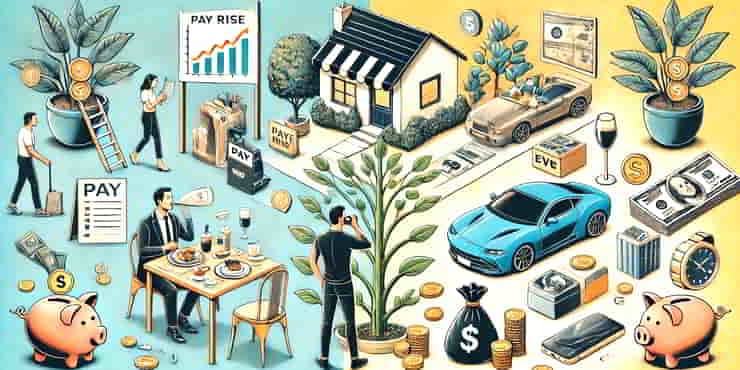Time Management? Here’s A Better Way

Estimated reading time: 15 Min
Time Management; the most talked about skill and mostly an illusion. To achieve what we want it’s far more useful to manage priorities, habits, energy and motivation.
- Priorities – act on priorities first;
- Find useful habits; avoid less than useful habits;
- Manage personal energy for thinking, decision-making, and taking action;
- Manage motivation for when the going gets tough.
Short Of Time? – That’s An Illusion!
A shortage of time is the most often quoted reason for not getting something done.
Really? More than often it’s an excuse, and a poor one at that!
I’m sorry if that seems unfair to you.
The thing is, we all have equal quantities of time. It’s a resource that we can’t manage.
I regularly hear people ask for help with “time management.”
Well… to my way of thinking, the concept of time management is an illusion!
The fact is that time just ticks away; whatever we do is outside of our control, which makes the concept of time management, at best, misleading.
Now, I admit, I’m making an assumption, which is that when people talk about time management or a shortage of time, their overriding intention is to get things done!
“Lack of direction, not lack of time, is the problem. We all have twenty-four-hour days.”
Zig Ziglar
We can use time wisely or waste it, but since we can’t acquire more of it, it’s unreasonable to think that we can manage time itself. From moment to moment, we don’t even know how much time we have!
Most of us live with the hope that we have plenty left.
Some of us waste enormous amounts of time attempting to learn “time management” when we have no idea how much time is available to us in the first place.
So why focus on a resource that is so unpredictable? Why buy into the idea that they can manage time? Honestly, I don’t understand this.
So rather than buying into the illusion that you can manage time, isn’t it better to do what you can to manage decisions and actions towards getting the things you want done?
As Zig Ziglar said: “Lack of direction, not lack of time, is the problem. We all have twenty-four-hour days.”
Well, I do agree with this, and it’s a mindset thing that hints at a bigger picture.
A lack of direction certainly inhibits our ability to make the best use of whatever time we have. Then, once we’ve figured out enough of what we want to be able to see a direction, being able to clearly describe why we want to move in that direction is important too.
I believe most people do have some idea of what they want to achieve and yet get nowhere towards achieving whatever it is.
Well, in addition to knowing what you want to achieve and why, there are at least five other areas that can be managed that can ensure you make the most of the time available:
- Your ability to decide upon priorities and handle them;
- (Use of a process for achieving whatever you want);
- Develop useful daily habits and avoid less-useful habits;
- Your personal energy for thinking, decision-making, and taking action;
- Your ability to stay motivated when the going gets tough
With a focus on managing these areas, you can avoid getting stuck and make progress.
Now a quick rider here. It’s ok to remain stuck if that’s what you want. It’s ok to be heading off in a less than optimal direction if that’s what you want or if you haven’t figured out what you really want yet.
Also, always know that what other people think is less important than how you feel about something.
That doesn’t mean you should ignore others’ points of view. Words of wisdom are often offered in order to help. However, your decisions are your own, whether they turn out to be useful or not.
Managing Priorities

In today’s fast-paced and demanding world, it can be challenging to prioritise tasks and stay on top of your responsibilities.
With so many different factors pulling your attention in different directions, it’s easy to feel overwhelmed and stressed.
Fortunately, by following a few simple strategies, you can simplify your life and increase your efficiency and effectiveness (productivity).
With a few useful techniques, getting things done doesn’t need to be a battle!
Eisenhower Matrix
The Eisenhower Matrix teaches a method for distinguishing between those things that are important, urgent, not important, and not urgent.
It was made popular by Stephen Covey in his book “The Seven Habits of Highly Effective People” and is an excellent tool for prioritising things to do.
To learn more, see this excellent article on the Asana site about the The Eisenhower Matrix.
Set Clear Goals
I make no apology for repeating this. If you don’t know where you’re going, it’s difficult to get anywhere meaningful. Before you do anything else, you need to define your aspirations and have a clear direction.
You might be able to think of many different types of goals…
I usually use just three types of goals (or aspirations):
- First, there are defined outcome goals.
- Second, there are the action steps or goals that we plan to achieve our ‘outcome goals’,
- Third, measurement goals, often called Key Performance Indicators (KPIs),
The question is, do you actually know where you’re going (what are your desired outcomes)?
By becoming clear about your desired outcomes, you can figure out the most important things you need to do to get started. By taking the time to clarify your aspirations and priorities, you’ll know what needs to be done now and next.
You’ll be in charge of your life instead of feeling like you’re spinning your wheels.
That’s a great place to start! So, how do you set goals?
If this is the first time you’ve written down your aspirations and things to do, it can take a little time.
Start by jotting down everything you need to do, along with what you think you want to achieve.
Don’t hold anything back; write down absolutely everything that’s on your mind. Short-term or long-term. Things that you consider you must do, should do, or even could do; write them all down.
Of course, if you are familiar with using a computer and, ideally, a database or spreadsheet, you can save a lot of time later as you organise your list.
Then, go through your list and prioritise everything relative to each other. Be strict with yourself. Your prioritised list should show what you consider to be the most important things first.
Your goal isn’t to end up doing everything; it’s to become organised enough to be able to make decisions about what you actually act upon at any moment, based on clear priorities.
Take the time to decide what must get done, what should get done and what could get done. Then you can take action from there.
Planning

It’s been said that having a list of things to do without defining target dates is a wish list rather than a plan. I beg to differ!
For me, having a list of things to do without priorities assigned is a wish list.
I wouldn’t know where to start.
By figuring out my priorities, where to start becomes obvious. Then the challenge is being organised to keep moving forward.
“How we spend our days is, of course, how we spend our lives. What we do with this hour, and that one, is what we are doing.”
Annie Dillard
I do agree that keeping a calendar or diary of important upcoming events is valuable. Keeping a schedule represents a plan and shouldn’t be confused with managing time.
The most important events on the schedule are, of course, those that must not be missed. or that must be remembered, such as medical appointments, legal deadlines, and personal commitments that you regard as important.
Others are things that you either should or could achieve. In this context:
- “Must dos” means you have no choice because you’ve made a strong commitment or perhaps for legal reasons. You need to do this. In my experience though “must do” dates are mostly imposed by someone else, or by a third-party organisation.
- “Should dos” may mean you’ve made a strong commitment but if you don’t achieve a scheduled date any negative effects don’t impact anyone else. You know you want this.
“Could dos” means, maybe someday! You think you want this but at this point in time, it’s a “nice to have” outcome.
Create A Short List
If you’re well organised, the chances are that you have a seemingly uncontrollable and extensive to-do list,
With clear priorities, the list is much more easily controlled.
By identifying a short list of must-do items the long list of written down should-dos and could-dos can be reviewed periodically and kept out of the minds-eye until appropriate.
This is a great way to reduce stress!
Then on a daily basis, you can focus on a few essentials at the top of the list. Each day focus on the “next steps” leading towards your aspirations.
When you decide what to do today or tomorrow, try to focus on the essentials. What are the three or four things you absolutely must get done to keep moving toward your aspirations?
Are there any things to do, that if not done, will prevent you from moving forward? Those are where to focus.
It’s important to review your longer lists regularly. Perhaps monthly or quarterly is enough. Most of the time, however, don’t focus on any more than the top, most important items to get done.
Daily Habits
“It seems as though the second half of a person’s life is made up of nothing but the habits they accumulated during the first half.”
Fyodor Dostoyevsky
What we’re experiencing in our lives today is the net outcome of all that went before, and what we do today adds to or is the foundation for what we will experience in the future.
The thing is that what we choose to “practice” or focus on, on a regular basis (some being daily) are leading to our most likely outcomes.
However, “most likely outcomes” don’t necessarily mean being useful! It’s just too easy to focus daily on things that are less than useful.
So it makes sense for our priorities to include things that need to be carried out on a regular basis (some daily) for us to achieve what we want. I guess that’s obvious…
Even so, we mostly use our willpower to get started and with focused persistence, we can turn willpower into a useful habit. By persisting, we eventually create habits that carry us through.
Now realise this… whatever we persist in focusing on, over time, can become part of our subconscious belief system from which habits are formed, whether useful or not!
So it’s a good idea to make sure that any topic that you apply persistent focus on is useful…
Create A Daily Routine

But how many people actually have a self-imposed regular routine based on what they want to achieve?
I believe most people achieve some remarkable outcomes… often though, based on what other people want them to achieve.
This is how employment works. That’s OK if it’s what you want.
However, if you want to achieve something different to that dictated by a third party…
… then it only makes sense to create your own daily routine designed to lead towards achieving whatever it is that you want.
As you achieve things that you want then your daily routine should evolve. Nothing is set in stone. As aspirations are achieved then your daily routine will need to change to meet the demands of your next desire. Any road includes detours and setbacks. Such experiences might need a re-think of your daily routine.
Manage Personal Energy

The digital age has redefined our work, our home life, and even the way we socialize and the pace of our lives.
These changes have come very fast in comparison with human evolution, and at a cost.
I believe, generalising a little, that for most of us, our brains haven’t kept up with the speed of change. The stress that accompanies this fast-paced life is taking its toll. Stress levels are at an all-time high, leading to burnout, anxiety and depression among many people.
No matter your situation, it’s important to take care of yourself so you can continue to thrive. We all need to learn how managing personal energy levels can help to manage stress and prevent burnout.
The Tide Of Energy Ebbs And Flows
As we go through the day, our energy levels go up and down. So managing energy levels is a key skill to making the most of the day.
Being aware of how things are at any moment is paramount to managing most things including your personal energy level. You can be anything from completely energized to completely exhausted.
How you feel from a personal energy point of view can help with decisions about when to get things done, and when to take a rest.
Identify your energy drainers
When you’re feeling stressed out and overwhelmed, it can be hard to identify the cause. It’s useful to identify your triggers so you can manage them. Most people have a handful of different energy drainers that affect how they feel throughout the day. Some common examples are:
- Sleep deprivation
- Some physical activity
- Overwork
- Emotional triggers
- Nutritional deficiencies
Sleep deprivation might be the most obvious and will take a toll on your energy and your ability to focus and make sound decisions.
Physical activity is good for you, and light exercise can help you instantly increase your energy levels; too much can leave you feeling drained. That’s great when it’s time to sleep!
Overwork can create a cycle of stress, leading to poor decision-making and an inability to see the big picture.
Emotional triggers can have a major impact on your mood, energy levels and outlook on life and can affect those around you as well.
Managing Energy When Awake
Meditation Can Help
Research has shown that meditation can help people to become more resilient in the face of stress. It’s also an excellent way to recharge your energy levels.
Studies have found that even a few minutes of meditation can help you to reduce levels of cortisol… the hormone that’s responsible for the “fight or flight” response.
Meditation can also improve your attention span and ability to concentrate. These two factors are key for all people, but especially those in high-pressure environments.
It pays to find a meditation practice that works for you; keep in mind that what works for one person may not work for another.
You might want to consider trying out different techniques until you find one that really resonates with you.
Take a break
Sometimes the best way to recharge your energy levels is to take a break and do something completely different for a short time. It’s important to make sure that the break is truly restorative; not just a break from work but from thinking about your work.
When you take a break, your brain will find it easier to come up with new and creative solutions to problems.
The Pomodoro Technique is a way to build this into your routine…
Use Pomodoro Technique
You might want to experience the scientifically proven benefits of the Pomodoro technique.
Although it’s most often presented as a “time management” technique, in reality, it’s a great way to help maintain your focus on getting tasks done, and managing energy levels.
University studies in the USA and Europe have shown that humans are able to focus intently on something for an average of about 22 minutes before we can benefit from a short (5 to 10-minute break) doing and/or thinking something completely different.
So a good practice is to string together a series of “focus sessions” interspersed with short breaks. Personally, I use 25-minute focus sessions with 5 to 10-minute breaks in between.
These surprisingly short breaks help rejuvenate energy levels such that deep focus can be maintained for the next session.
Go for a walk
Walking is perhaps the most underrated way to reduce stress and it can recharge your energy levels as well. Studies have shown that being in nature is a fantastic way to reduce stress.
It also has a number of other benefits including improved sleep, less anxiety and reduced blood pressure.
It’s important to walk in a place that is as close to nature as you can get: in your neighbourhood, on a trail, or near a park are all great options.
In addition…
Your Personal Biological Rhythm
Everybody has their very own natural energy level cycle or biological rhythm. There are a number of contributors to this phenomenon, the most powerful being the Circadian Rhythms. I’m not going into the science here…
What are your most productive hours of the day, for you?
What’s the most productive day of the week, for you?
If you don’t know, you can probably guess. Most people are most productive in the morning, and then again later in the afternoon.
Your productivity levels depend on a variety of factors, including your health and your diet… so everyone is different.
However, if you take a few minutes to analyze your productivity levels, you’ll be able to capitalize on your best hours.
Motivation
If you follow the “Blueprint To Success”, outlined in a separate post here, it’ll become relatively easy to stay motivated.

There can be many reasons for procrastination. Assuming that the desired outcome has been developed with a plan to achieve it, there seem to be two main reasons for a lack of motivation causing procrastination.
First is not knowing why you want to achieve something. A “reason why” hasn’t been thought through.
Whenever the going gets tough, a reminder of why you set out in the first place can make an enormous difference to your ability to keep going.
Second is taking on too much at once for some or all of those involved.
Perhaps over-enthusiasm prevails at the beginning. Over enthusiasm leads to believing that anything is possible (actually, most things are possible of course) but often with unrealistic expectations for getting things done efficiently with the resources available.
This in turn leads to feelings of overwhelm.
It’s interesting that projects often take between 50% and 100% more resources (including time) than expected! There are many reasons for this… but underestimating how long tasks will take is the most common.
So don’t over-commit… I know… you’ve probably heard it all before… you should never overcommit.
This is especially important when you’re trying to prioritize and get things done.
When, out of the goodness of your heart, you accept too many commitments, you’re setting yourself up for stress and failure. You don’t need to be superhuman and you do need to be realistic.
Don’t commit yourself to more than you can handle.
This might be labouring the point, but it is that important… If someone asks you to help out with a project, be honest with them. If you’re not certain, don’t agree to something you know you won’t have time to finish.
Even if you’re not sure how much time you have, you can still say no. You don’t need to feel guilty about saying no – there are plenty of other good people who will do what you don’t have time for.
Summary
Getting things done doesn’t have to be difficult.
All you need to do is follow a few simple strategies to get yourself organised, then take action.
Start by setting goals and making a short list of your chosen priorities. Block out your most productive hours, and don’t over-commit.
With this in mind, you should be able to prioritize tasks more effectively and get more things done!
“People are so busy wishing for more time and better resources that they fail to make the most of the time and resources they have. Be great in small ways and you may be surprised by what you’ve achieved within a year or two.
James Clear
No matter what stage of your life you’re at, it’s important to take care of yourself to stay at your best. Self-care isn’t selfish… it can help you to be more productive and collaborative.
It can also help you to be a better friend and colleague.
The pace of life is unlikely to slow down any time soon. This means that it’s more important than ever to take care of yourself so that you can keep up with this fast-paced world.
Managing your energy levels and being clear about your priorities are great ways to ensure you take care of yourself so that you can continue to thrive.
If you’ve read this far… thank you! You are appreciated.
If you have anything to add, please do leave a comment below… if you find this post useful, please also share it…
🙂
Richard






